The drop-off event is intended to prevent prescription drug abuse and theft by removing unwanted, unused or expired pills from homes. Prescription drug abuse, particularly involving opioid pain medications, is a growing concern locally, statewide and nationally. One way prescription drugs enter the illicit abuse trade is by theft from homes where medications are left unattended.
The service is free and anonymous.
Darke County
Family Health Center, 5735 Meeker Road, Greenville
Miami County
Miami County Sanitary Engineering Department, 2200 N. County Road 25-A, Troy
Shelby County
Shelby County Fairgrounds, Blue Building entrance, S. Highland Avenue, Sidney
In addition to the one-day event, each county has a secure prescription pill drop box. Locations are: Greenville Police Department; Shelby County Sheriff's Office; Miami County Sheriff's Office. Drugs must be in pill or powder form only; needles and liquids cannot be accepted in the drop boxes.
To find a Take-Back site in other areas, search the Drug Enforcement Agency's database of registered sites.



 RSS Feed
RSS Feed
